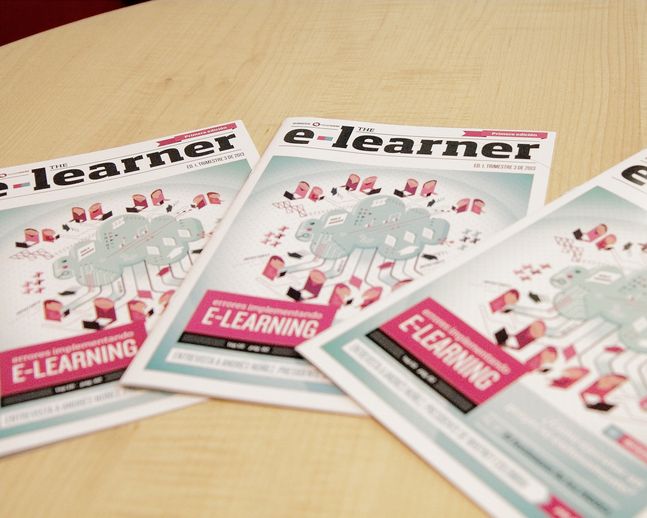El fenómeno de los MOOC’s
E-Learn Magazine, 2013/03/05.
Abstract
Interview with Sergio Luján Mora, author of the MOOC iDESWEB, Introducción al desarrollo web (The e-learner, June 2013).
More information: El fenómeno de los MOOC’s

Translation of the original interview published in Spanish.
Since 2000, we have seen initiatives offering free courses on the Web, but certainly 2012 was considered the year of the MOOCs (English acronym for Massive Open Online Courses), following the success of the course "Introduction to Artificial Intelligence" organized by Sebastian Thrun, a professor of Stranford University, and Peter Norvig, Director of Research at Google, with about 160,000 students enrolled. This was the first time in history that so many people gathered together in the same course.
After this successful reception, the Massachusetts Institute of Technology (MIT) offered its first MOOC on "Circuits & Electronics" with about 120,000 students all over the world. In this way, institutions such as Harvard University and MIT have accepted MOOCs as the future of virtual education, and have established a joint project called edX where they offer free courses for anyone, anywhere. We are facing initiatives aimed to break the current educational model.
Sergio Luján Mora, professor at the Department of Software and Computing Systems at the University of Alicante (Spain), highlights that most MOOCs were born as private initiatives by one or more teachers, not because initiatives by institutions. Therefore, many educational institutions are acting as "spectators" while the situation of the MOOC movement is clarified.
From the point of view of the MOOCs students, these courses satisfy some "massive" needs of knowledge that exist nowadays. We have moved from industrial society to information and knowledge society, and more and more people have needs to learn and to know, not only by a personal need, but by a professional need.
Unfortunately, traditional education systems, with inflexible schedules and the need to attend classes in a classroom, are not suitable for many people who have family and work. In some studies that have been done on the profile of students in MOOCs, it has been noticed that almost 50% of students aged over 30 years.
MOOCs offer enormous possibilities in Latin America, but to take advantage of MOOCs universities in the region must be active members in content production, and define their participation or contribution strategy and not just spectators or consumers of the courses. Platforms like MiriadaX, for example, offer teachers or teaching teams of any Latin American universities belonging to Red Universia, the possibility to create and deliver Massive Open Online Courses (MOOCs).
Professor Sergio Luján Mora, knows some initiatives that have emerged in Latin America, but he thinks they should join forces. For example, in the United States, Harvard University and MIT, two universities that compete with each other have come together to form the nonprofit organization edX. In Latin America something similar is needed, the creation of a consortium to group individual initiatives to provide greater value.
At the moment, it is uncertain the business model of the MOOCs, because MOOCs are still in progress. This does not mean however, that there are no obvious advantages and opportunities for institutions in our region, in terms of coverage of new segments that require it. Those universities with a vision and an appropriate strategy (towards the inside and outside of their institutions) to address the peculiarities of our environment, will have a very large advantage over others.
Professor Sergio Lujan, adds, who knows some initiatives that have emerged in Latin America, but thinks it should join forces. For example, in the United States, Harvard University and MIT, two universities that compete with each other have come together to form the nonprofit organization edX. In Latin America needed something, the creation of a consortium to take individual initiatives to provide greater value.
At the moment, it is uncertain the business model of the MOOCs it is a movement that is still in formation. This does not mean however, that there are no obvious advantages and opportunities for institutions in our region, in terms of coverage of new segments that require it. Which universities and institutions give the first steps in the adaptation of this model disruptive learning management, remains to be seen. The truth is that those who can seize this trend, with a vision and an appropriate strategy (towards the inside and outside their institutions) to address the peculiarities of our environment, will have a very large advantage over others.
Sergio Luján Mora earned his Ph.D. in Computer Engineering at the University of Alicante in 2005. His current research topics include web accessibility and usability, development of web applications, design of data warehouses, online learning and object-oriented programming. He is the author of the MOOC "Introduction to web development" (iDESWEB, Introducción al desarrollo web) (http://idesweb.es/), based on a subject he teaches at the University of Alicante. Twitter: @sergiolujanmora
More information: El fenómeno de los MOOC’s